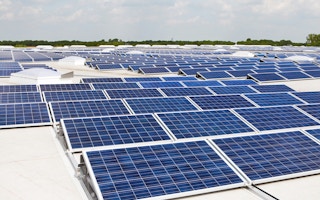Japan is now home to the second highest number of businesses committed to sourcing 100 per cent renewable energy after the United States.
To continue reading, subscribe to Eco‑Business.
There's something for everyone. We offer a range of subscription plans.
- Access our stories and receive our Insights Weekly newsletter with the free EB Member plan.
- Unlock unlimited access to our content and archive with EB Circle.
- Publish your content with EB Premium.
Major Japanese brands including global camera maker Nikon and instant food company Nissin joined the ranks of global corporate clean energy initiative RE100 on Monday, bringing its number of Japanese firms to 50, RE100 said in a press release. This is in addition to 60 global RE100 members with international operations in the country.
RE100 is led by international non-profit The Climate Group, which works with business and government leaders to address climate change, in partnership with CDP, an organisation that helps companies cut greenhouse gas emissions.
The announcement comes as experts expect Japan to revise its renewable energy target in the coming weeks as it races to reach net-zero emissions by 2050, a goal the nation’s prime minister announced in October last year.
Despite Japan’s climate pledge, businesses in the country have struggled to adopt 100 per cent renewable energy, making it a “challenging market” for firms seeking to decarbonise, said RE100, which brings together 300 companies from around the globe that have pledged to use green power for their operations.
Clean power is more expensive than more polluting sources of energy and scarcely available in Japan. This means Japanese firms have tended to set less ambitious goals for adopting 100 per cent renewable power compared to the global average.
Other Asia Pacific markets with a similar reputation include Australia, mainland China, Indonesia, Singapore, South Korea, and Taiwan.
Last month, 92 major Japanese corporations—including Sony Corporation, Nissan, and Ricoh—called on the Japanese government to grow the share of green power in the country’s energy mix by 2030.
In the statement, the firms, which are all members of the Japan Climate Initiative, called for renewables to make up 40 to 50 per cent of Japan’s electricity mix by 2030—or roughly double the government’s current target of 22 to 24 per cent.
The companies said Japan’s climate pledge requires a significant and rapid expansion of renewable energy as well as greater energy efficiency.
“In order for Japan to meet its responsibilities to be one of the leaders in global efforts, the target needs to be much more ambitious. An ambitious target will stimulate renewable energy deployment, and Japanese companies will be able to play a greater role in the global business environment, where decarbonisation is accelerating,” the statement read. “It will enable Japanese companies more committed to the challenge of mitigating the climate crisis.”
Last October, a similar initiative saw over 160 Japanese companies back a more ambitious national target of 50 per cent renewable electricity by 2030 to spur Japan’s energy transition and decarbonise its economy.
A recent report by RE100 noted that large-scale clean energy procurement options for corporates in Japan are limited to hydropower plants operated by regional utilities and feed-in tariff-certified renewables, which include solar power.
While renewable energy certificates are in high demand, tracking systems in Japan are fragmented and relatively cumbersome to navigate. Installing rooftop solar panels is an option, but this can only meet a small portion—less than 20 per cent—of commercial buildings’ power demand.
RE100 stated that allowing companies to buy clean electricity directly from generators through corporate power purchase agreements would lead to more market competition and bring down costs.
Helen Clarkson, chief executive officer at the Climate Group, said RE100’s new additions meant corporate Japan had reached a “milestone” on its path towards cleaner energy. More government action, however, is needed to encourage more firms to make renewable power commitments.
“As policymakers review Japan’s energy mix over the coming weeks, they must seize the opportunity to align with the net-zero goal and target 50 per cent renewable electricity by 2030. This will send the right signals to the market and help improve supply—a win-win for business and government,” she said.
Japan is the world’s fifth-largest emitter of carbon dioxide and home to a wide range of highly polluting sectors including steel producers and carmakers. In 2018, coal—the world’s dirtiest fossil fuel—made up more than 30 per cent of its energy mix, while renewables supplied only 17 per cent of its electricity. Natural gas supplied 38 per cent and nuclear, 6 per cent.










